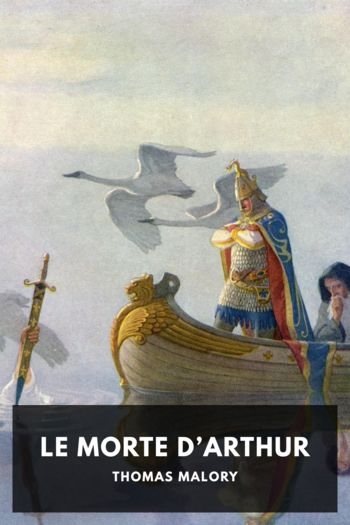Le Morte d’Arthur - Thomas Malory (best android ereader TXT) 📗

- Author: Thomas Malory
Book online «Le Morte d’Arthur - Thomas Malory (best android ereader TXT) 📗». Author Thomas Malory
Then every man rode to his lodging, and Sir Bleoberis and Sir Ector rode with Sir Tristram and La Beale Isoud unto their pavilions. Then as Sir Palomides was at the well wailing and weeping, there came by him flying the kings of Wales and of Scotland, and they saw Sir Palomides in that arage. Alas, said they, that so noble a man as ye be should be in this array. And then those kings gat Sir Palomides’ horse again, and made him to arm him and mount upon his horse, and so he rode with them, making great dole. So when Sir Palomides came nigh the pavilions thereas Sir Tristram and La Beale Isoud was in, then Sir Palomides prayed the two kings to abide him there the while that he spake with Sir Tristram. And when he came to the port of the pavilions, Sir Palomides said on high: Where art thou, Sir Tristram de Liones? Sir, said Dinadan, that is Palomides. What, Sir Palomides, will ye not come in here among us? Fie on thee traitor, said Palomides, for wit you well an it were daylight as it is night I should slay thee, mine own hands. And if ever I may get thee, said Palomides, thou shalt die for this day’s deed. Sir Palomides, said Sir Tristram, ye wite me with wrong, for had ye done as I did ye had won worship. But sithen ye give me so large warning I shall be well ware of you. Fie on thee, traitor, said Palomides, and therewith departed.
Then on the morn Sir Tristram, Bleoberis, and Sir Ector de Maris, Sir Gareth, Sir Dinadan, what by water and what by land, they brought La Beale Isoud unto Joyous Gard, and there reposed them a seven night, and made all the mirths and disports that they could devise. And King Arthur and his knights drew unto Camelot, and Sir Palomides rode with the two kings; and ever he made the greatest dole that any man could think, for he was not all only so dolorous for the departing from La Beale Isoud, but he was a part as sorrowful to depart from the fellowship of Sir Tristram; for Sir Tristram was so kind and so gentle that when Sir Palomides remembered him thereof he might never be merry.
LXXXIHow Sir Bleoberis and Sir Ector reported to Queen Guenever of the beauty of La Beale Isoud.
So at the seven nights’ end Sir Bleoberis and Sir Ector departed from Sir Tristram and from the queen; and these two good knights had great gifts; and Sir Gareth and Sir Dinadan abode with Sir Tristram. And when Sir Bleoberis and Sir Ector were come there as the Queen Guenever was lodged, in a castle by the seaside, and through the grace of God the queen was recovered of her malady, then she asked the two knights from whence they came. They said that they came from Sir Tristram and from La Beale Isoud. How doth Sir Tristram, said the queen, and La Beale Isoud? Truly, said those two knights, he doth as a noble knight should do; and as for the Queen Isoud, she is peerless of all ladies; for to speak of her beauty, bounté, and mirth, and of her goodness, we saw never her match as far as we have ridden and gone. O mercy Jesu, said Queen Guenever, so saith all the people that have seen her and spoken with her. God would that I had part of her conditions; and it is misfortuned me of my sickness while that tournament endured. And as I suppose I shall never see in all my life such an assembly of knights and ladies as ye have done.
Then the knights told her how Palomides won the degree at the first day with great noblesse; and the second day Sir Tristram won the degree; and the third day Sir Launcelot won the degree. Well, said Queen Guenever, who did best all these three days? So God me help, said these knights, Sir Launcelot and Sir Tristram had least dishonour. And wit ye well Sir Palomides did passing well and mightily; but he turned against the party that he came in withal, and that caused him to lose a great part of his worship, for it seemed that Sir Palomides is passing envious. Then shall he never win worship, said Queen Guenever, for an it happeth an envious man once to win worship he shall be dishonoured twice therefore; and for this cause all men of worship hate an envious man, and will shew him no favour, and he that is courteous, and kind, and gentle, hath favour in every place.
LXXXIIHow Epinogris complained by a well, and how Sir Palomides came and found him, and of their both sorrowing.
Now leave we of this matter and speak we of Sir Palomides, that rode and lodged him with the two kings, whereof the kings were heavy. Then the King of Ireland sent a man of his to Sir Palomides, and gave him a great courser, and the King of Scotland gave him great gifts; and fain they would have had Sir Palomides to have abiden with them, but in no wise he would abide; and so he departed, and rode as adventures would guide him, till it was nigh noon. And then in a forest by a well Sir Palomides saw where lay a fair wounded knight and his horse bounden by him; and that knight made the greatest dole that ever





Comments (0)